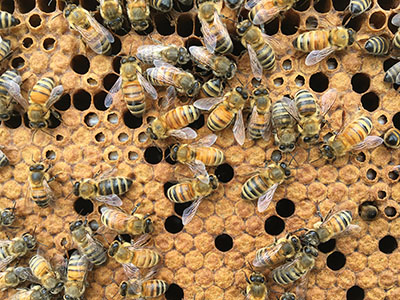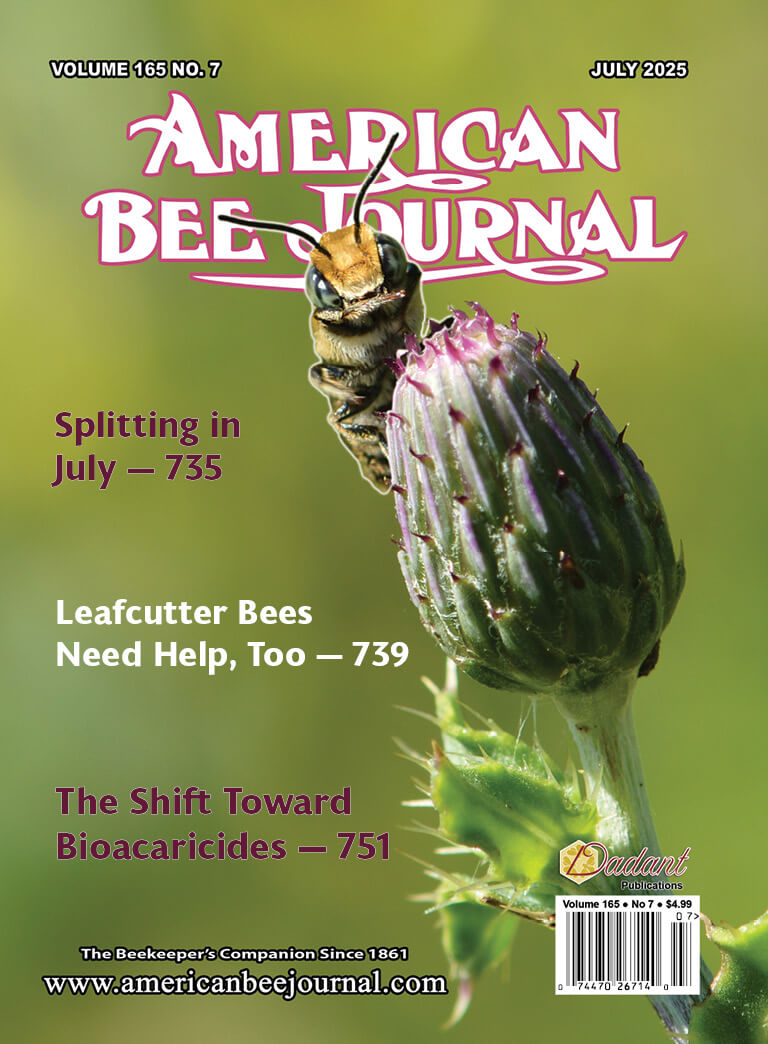
New research shows that honey bee brood has a surprising role in social disease resistance
A larva has a pretty good life. Breakfast in bed all day, constant warmth, no work (other than maybe spinning a cocoon), and no responsibilities. Sure, larvae passively produce pheromones that help maintain the colony’s social cohesion1 and inhibit laying workers,2 but their main goal is simply to swim in a bath of food, eat, grow until metamorphosis, then kick back until eventually emerging as adults to begin their working lives. But is that really all larvae and pupae do?
Evidence is piling up that larvae and pupae might actually play a bigger role in the colony’s social immune system than previously thought. Dr. Kaira Wagoner—from the University of North Carolina at Greensboro—studies hygienic behavior, which is one form of social immunity where workers detect and remove diseased and parasitized brood. By eliminating sick brood from the colony before the pathogens they harbour can infect others, these hygienic workers give their colony a better chance of fighting off the disease. Now, Wagoner and her colleagues have shown that the developing young are more than just passive victims; they could actually be active players contributing to overall hygiene.
When brood becomes infected or infested, the sick offspring emit odorant signals that trigger the workers to perform hygienic behavior. Researchers all around the world have worked to identify these odorants, and many have succeeded.3-5 But adult worker bees have traditionally been given the credit for hygienic behavior, owing to their superior sense of smell. “Until a few years ago, hygiene-related research seemed primarily focused on adult olfactory capabilities. But it remained unclear what it was, exactly, that the adults were detecting,” Wagoner explains. In her paper, published in the Journal of Economic Entomology,6 she describes her work suggesting that improved brood signaling, in addition to the ability of adults to detect that signal, is actually very important for hygiene.
Previously, I had thought that brood from different colonies should emit similar odorant signals upon death or pathogen infection, and it’s the ultra-sensitivity of adults to these odorants that makes the colony hygienic. I based this assumption largely on research from the late 1990s, where researchers showed that there was no significant relationship between the results of freeze-killed brood assays (the main method of testing for hygienic behavior) and the colony source of the brood that was used.7 In their experiment, researchers froze patches of capped brood on two different frames, then introduced one frame into an unrelated colony, while replacing the other in its original hive. They found that there was no difference in colonies’ hygienic scores (the percent removal of the freeze-killed brood) when tested with their own brood or with foreign donor brood, suggesting that the brood source wasn’t significantly influencing hygiene.
For years, the selective breeding programs that followed assumed that there was no effect of the brood source on hygienic behavior. For Varroa-sensitive hygiene (VSH)—a specialized form of hygienic behavior targeting varroa-infested cells specifically—we knew there was a brood effect,8 but it was generally agreed that the trait was dominated by the adults’ ability to perceive the diseased state. But now, that idea is being turned on its head.
Wagoner and her colleagues showed that when brood from a highly hygienic ‘donor’ colony was introduced to a poorly hygienic ‘recipient’ colony, workers in the recipient colony removed more wounded and varroa-infested brood than when the same test was conducted using brood from an unrelated, poorly hygienic donor. The reverse was true when brood from poorly hygienic colonies was donated to highly hygienic ones—the hygienic colonies did not remove as much as they did if the brood came from a very hygienic colony. The work suggests that hygienic behavior depends not only on workers having superior olfactory sensitivity, but perhaps also on the brood emitting stronger odorant signals.
This doesn’t mean there was anything wrong with the original research that failed to identify a brood effect. Rather, it was simply testing the wrong hypothesis. Back then, the researchers weren’t introducing brood from hygienic colonies into non-hygienic colonies (or vice versa), specifically. They were simply testing if there was a general effect of ‘foreign’ versus ‘self’ brood on the ….


